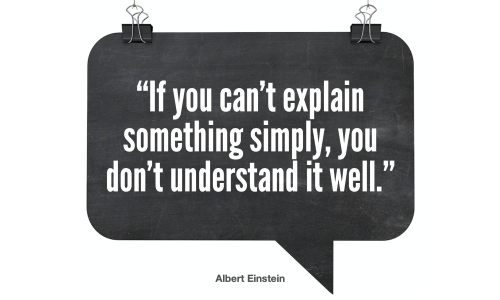Gobbledygook makes you look less intelligent
There may be a link between jargon and poor business performance, according to a study by Deloitte Consulting. In one test, SEC documents got more and more obscure as the organizations got deeper and deeper into trouble.

“We think that’s a good indicator of the linkage between clear and straight communications and business performance, including the issue of transparency and trust,” Deloitte Consulting partner Brian Fugere told Reuters.
No wonder The New York Times, The Wall Street Journal and others have begun reporting readability of SEC documents in the financial pages. And the Chicago Sun-Times recently quoted this internal Chevron memo:
Reporter Zay N. Smith’s response:
“Sell your Chevron stock. Sell it now.”
But jargon doesn’t just suggest that your company may be in trouble. It also makes you look less intelligent.
Demonstrates your ignorance.
Using stuffy words might make you sound stuffy. But it won’t make you sound smarter. In fact, people who use big words when smaller ones will do actually sound less intelligent, according to research at Princeton University.
“While intelligent people can often simplify the complex, a fool is more likely to complicate the simple.”
— Henry David Thoreau, American author and philosopher
In one experiment, a group of bright Princeton undergrads read the original translation of Descarte’s Meditation; another group read a simplified version. Participants who read the simplified version rated the author more intelligent than those reading the original version.
Why?
When people don’t understand information, they tend to go more with the original, often too-technical and undigested information from a primary source, says Joseph M. Williams in Style: Toward Clarity and Grace:
“As a novice in a field reads its professional prose, he will predictably try to imitate those features of style that seem most prominently to bespeak membership, professional authority. … Simultaneously, if a writer new to a field does not entirely control his ideas, his own prose will often slip into a style characterized by those same clumps of abstraction.”

As no less a genius than Albert Einstein wrote: “If you can’t explain something simply, you don’t understand it well.”
And keep in mind these words from Margaret Mead, American cultural anthropologist, who certainly learned her way around concepts that were initially foreign to her:
“If one cannot state a matter clearly enough so that even an intelligent twelve-year-old can understand it, one should remain within the cloistered walls of the university and laboratory until one gets a better grasp of one’s subject matter.”
___
Sources: Grant McCool, “Software to Cut the Bull from Corporate-Speak,” Reuters, June 20, 2003

Leave a Reply